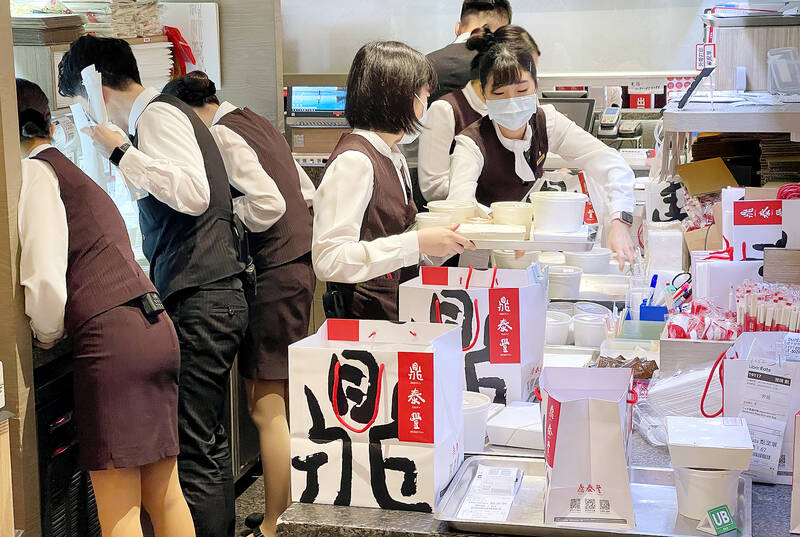Retail sales and food and beverage sector revenue last month hit single-month highs, the Ministry of Economic Affairs (MOEA) said on Thursday.
Retail sales for last month totaled NT$408.2 billion (US$13.49 billion), an increase of 4.2 percent from a year earlier, while sales posted by the food and beverage sector totaled NT$99.5 billion, up 31.2 percent, ministry data showed.
However, sales of wholesale items last month totaled NT$915.7 billion, down 18.4 percent from a year earlier, the ministry said.

Photo: CNA
The decline in wholesale business was mainly caused by weak external demand and inventory adjustments by customers, MOEA’s Department of Statistics deputy director Huang Wei-chieh (黃偉傑) said.
As such, wholesale sales of machinery and equipment, building materials, chemicals and household appliances dropped 19.1 percent, 28.4 percent, 31.9 percent and 22.7 percent respectively from a year earlier, Huang said.
Growth in retail business was backed by peak consumer spending ahead of the Lunar New Year holiday, coupled with easing of COVID-19 restrictions, which facilitated a rise in demand for travel and shopping.
This upward trend was also reflected in the food and beverage sector, as it benefited from companies organizing year-end banquets, while families also dined out more during the holiday period last month.
With the government set to issue a cash subsidy of NT$6,000 to Taiwanese and eligible foreign nationals, the retail and catering sectors are expected to post steady growth this year, Huang said.
The economic growth rate is estimated to rise by 0.35 to 0.45 percentage points after the cash handout, which is expected in April, he said.
Commenting on government plans to issue vouchers worth NT$5,000 to visitors to help boost the tourism sector, Huang said such payments would help stimulate the retail and catering sectors, but its effect would not be reflected in GDP.
A slowdown in global consumer demand and inventory adjustments in the industrial supply chain mean the wholesale sector’s downward trend would continue, he added.

HANDOVER POLICY: Approving the probe means that the new US administration of Donald Trump is likely to have the option to impose trade restrictions on China US President Joe Biden’s administration is set to initiate a trade investigation into Chinese semiconductors in the coming days as part of a push to reduce reliance on a technology that US officials believe poses national security risks. The probe could result in tariffs or other measures to restrict imports on older-model semiconductors and the products containing them, including medical devices, vehicles, smartphones and weaponry, people familiar with the matter said. The investigation examining so-called foundational chips could take months to conclude, meaning that any reaction to the findings would be left to the discretion of US president-elect Donald Trump’s incoming team. Biden

INVESTMENT: Jun Seki, chief strategy officer for Hon Hai’s EV arm, and his team are currently in talks in France with Renault, Nissan’s 36 percent shareholder Hon Hai Precision Industry Co (鴻海精密), the iPhone maker known as Foxconn Technology Group (富士康科技集團) internationally, is in talks with Nissan Motor Co’s biggest shareholder Renault SA about its willingness to sell its shares in the Japanese automaker, the Central News Agency (CNA) said, citing people it did not identify. Nissan and fellow Japanese automaker, Honda Motor Co, are exploring a merger that would create a rival to Toyota Motor Corp in Japan and better position the combined company to face competitive challenges around the world, people familiar with the matter said on Wednesday. However, one potential spanner in the works is

HON HAI LURKS: The ‘Nikkei’ reported that Foxconn’s interest in Nissan accelerated the Honda-merger effort out of fears it might be taken over by the Taiwanese firm Nissan Motor Co has become the latest buyout target in Japan as it explores a merger with Honda Motor Co and faces an overture from Hon Hai Precision Industry Co (鴻海精密), known as Foxconn Technology Group (富士康科技集團) internationally. Shares in Nissan yesterday jumped 24 percent, the most on record, to hit the daily limit, after the two Japanese automakers acknowledged that talks are ongoing to better position themselves for competitive challenges during a time of upheaval in the global auto industry. Foxconn — a Taipei-based manufacturer of iPhones, which has been investing heavily in factories to build electric vehicles — has also

CHIP SUBSIDY: The US funding would help alleviate the financial pressure from building two fabs in the US and should lift gross margins in 2026, the company said GlobalWafers Co (環球晶圓), the world’s third-largest silicon wafer supplier, yesterday said it is to receive US$406 million in subsidies from the US Department of Commerce for two new US fabs under the CHIPS and Science Act, with the first batch of the funds likely coming next year. The grant represents 10 percent of the planned investments of US$4 billion in advanced semiconductor wafer manufacturing facilities in Texas and Missouri, GlobalWafers said. The commerce department is to disburse the funds based on the completion of project milestones over a multiyear timeframe, the company said. Along with the tax credit, which is equal to